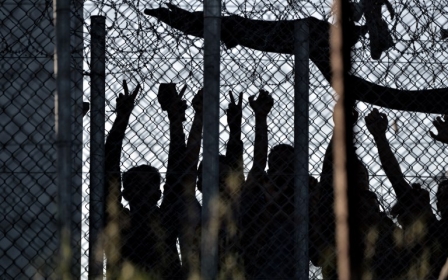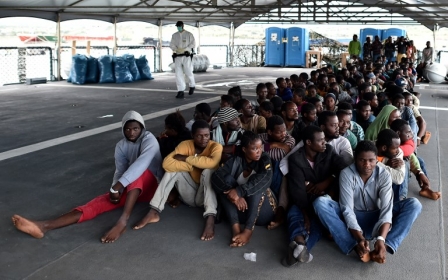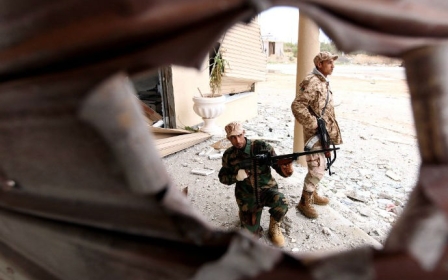Migrants in Libya: Pushed away, pulled back

TUNIS - For migrants, Libya is known for its perilous journey to Europe. But for one Nigerian woman, it was worth the risk to travel to Italy twice and escape chronic violence and poverty at home.
Eight years ago, Joy was a teenager when she was offered a job as a nanny in London. In the event, she was flown by plane to Milan, and ordered to work off a nearly $60,000 debt as a sex worker.
When Joy fled to what she thought was the safety of her home in southern Nigeria's Edo State however, it turned out to be "hell".
"Returning was one of the worst things I could have done," she said.
They know the road is dangerous, but are willing to take the risk. Maybe it's better than where they are. We all know its 50-50
- Joy, a Nigerian woman who has risked the trip to Italy twice
Her local recruiters repeatedly threatened the lives of her family for cash. Joy's uncle beat her, and sold her off to be married twice.
Years later, she resolved to return to Italy for a better life, by land through Libya, with her eyes open. "Everyone knows the story about Libya," she said. "We all know it is dangerous."
Once Libya was a destination for migrant workers, but life since the 2011 revolution has sharply deteriorated. Now split between ambitious governments and warring militias, Libyan communities are violent and poor, resulting in citizens increasingly paying for a boat ride to Europe too.
Joy's stories of travel through Libya share the nightmarish anecdotes told by others. She spent one year in Libya's harsh migrant prisons where she was forced to swap sex for freedom and watched her boyfriend shot dead by a Libyan man in a pay dispute.
Last year, Joy was luckily rescued at sea and brought to Italy. Women and children are more at risk in the centre of the boats, where they can be burned by diesel fuel, trampled and drowned during panic. Twenty-six Nigerian teenage girls were found drowned when their rubber boat sank last month.
"The girls make sure they have their 'madam's' numbers on their hand to call when they arrive," she said. "They are afraid of threats to their family, like I was. I haven't heard from them again."
Seraina Eldada, an aid worker on the search and rescue ship, AV Aquarius, said many Nigerian women they rescue remain silent about their ordeal.
"They are deep in the system when we meet them on board," she said. "They have been sold into prostitution and raped repeatedly. A large variety of stories are founded in sexual violence."
Keeping people 'by any means'
According to UNHCR, over 161,000 people have made the Mediterranean crossing to Europe this year; markedly down by 200,000 from last year.
A European Union (EU) deal with Turkey in 2016 to push back asylum seekers fleeing war zones in Syria, Iraq and Afghanistan has drastically curtailed arrivals to Greece.
In the central Mediterranean, the EU, with a robust lead from Italy, has sent funding and elite forces to equip and train the Libyan coast guard to push migrant boats back to Libyan shores, and detention centres policed by the Libyan interior ministry's Department to Combat Illegal Migration (DCIM).
Today, it is the Libyan coast guard that pulls migrants back from the sea and detains them in dire, but well-documented, conditions. Additionally, reported international pay-offs to key militias involved in the lucrative smuggling business to stop migrants leaving Libyan shores have created a severe bottleneck of people in arbitrary detention.
"The EU is not prioritising reform of the detention system, they are prioritising the capacity of Libyan authorities to keep people there by any means, so they don't reach European shores by boat," said Human Rights Watch researcher Judith Sunderland.
"The most worrying development is that the Libyan coast guard is increasingly intervening in international waters and taking people back to Libya - while Italian authorities instruct European vessels to stand by or even assist."
Last month, a CNN video clip purporting to show a slave auction triggered outrage from world leaders and protests around Europe.
"We have all been horrified by images of African migrants being sold as 'goods' in Libya," declared UN secretary-general Antonio Guterres. "Slavery and other egregious abuses of human rights have no place in the 21st century."
But slavery is not new in Libya for the media, international aid workers and rights officials, who have documented migrant conditions for years.
"We are aware that migrants can be purchased for between 270 and 800 Libyan dinar [now $200-$600]," said then-IOM head Jez Haslem in an Al Jazeera English report in 2012. "It depends on the nationality, what type of work and what they are willing to pay."
'50-50'
There are an estimated 700,000 foreigners now in Libya. While the GNA, the UN-supported government in Tripoli, asked for international support to tackle smuggling, other Libyan voices were defensive and suspicious this could pave the way for foreign intervention.
In the aftermath of the slavery outcry, leaders at the recent African Union-EU summit in Abidjan vowed to speed up an evacuation of migrants from Libya.
IOM says this year it repatriated nearly 14,000 migrants, 20 percent of whom were female, who said they wanted to return home, mostly to Nigeria, Guinea, Gambia and Mali. They are under pressure to send back another 15,000 people this month.
EU policy is trapping migrants in Libya, and not allowing them to leave to Europe
- Giulia Lagana, Open Society European Policy Institute researcher
"We come across victims of trafficking in official detention centres, or on the streets and abandoned," said IOM head Othman Belbeisi. "But we don't have access to the countless locked away by smugglers."
Concurrently, UNHCR plans to set up alternative "transit centres" in Libya for asylum seeking nationalities, including Eritreans, Somalis, Syrians and Palestinians. Libya is not a signatory to the 1951 refugee convention.
"EU policy is trapping migrants in Libya and not allowing them to leave to Europe," said Giulia Lagana, a researcher with the Open Society European Policy Institute.
"Migrants have become commodities in Libya as a consequence of EU policies. If migrant smugglers are suddenly being applauded for being migrant interceptors, this creates a market for potential abuse."
The migration issue is increasingly politicised. The EU will plough multi-billions of dollars more into security and border management along Libya's southern borders and development projects in the Sahel.
Joy, now with a baby son, has managed to avoid the dangerous criminals she knew during her first visit to Italy. But she doesn't think migration will end any time soon.
"I can be frank with you. Almost every home in Edo State has a family member in Europe," she said. "There are a lot of girls, much younger than me - their fathers and mothers and uncles bring them to the bus stop. They have social media, they know the road is dangerous, but are willing to take the risk. Maybe it's better than where they are. We all know its 50-50."
Stay informed with MEE's newsletters
Sign up to get the latest alerts, insights and analysis, starting with Turkey Unpacked
Middle East Eye delivers independent and unrivalled coverage and analysis of the Middle East, North Africa and beyond. To learn more about republishing this content and the associated fees, please fill out this form. More about MEE can be found here.







